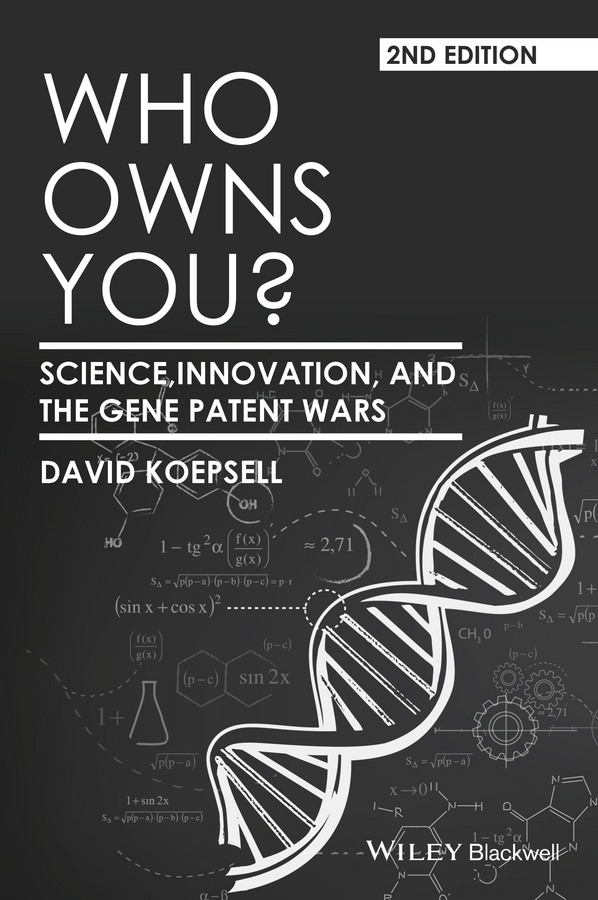Электронная книга: David Koepsell «Who Owns You? Science, Innovation, and the Gene Patent Wars»

|
The 2nd Edition of Who Owns You, David Koepsell’s widely acclaimed exploration of the philosophical and legal problems of patenting human genes, is updated to reflect the most recent changes to the cultural and legal climate relating to the practice of gene patenting. Lays bare the theoretical assumptions that underpin the injustice of patentson unmodified genes Makes a unique argument for a commons-by-necessity, explaining how parts of the universe are simply not susceptible to monopoly claims Represents the only work that attempts to first define the nature of the genetic objects involved before any ethical conclusions are reached Provides the most comprehensive accounting of the various lawsuits, legislative changes, and the public debate surrounding AMP v. Myriad, the most significant case regarding gene patents Издательство: "John Wiley&Sons Limited"
ISBN: 9781118948491 электронная книга Купить за 2883.85 руб и скачать на Litres |
Другие книги автора:
| Книга | Описание | Год | Цена | Тип книги |
|---|---|---|---|---|
| Who Owns You?. Science, Innovation, and the Gene Patent Wars | The 2nd Edition of Who Owns You, David Koepsell’s widely acclaimed exploration of the philosophical and legal problems of patenting human genes, is updated to reflect the most recent changes to the… — John Wiley&Sons Limited, электронная книга Подробнее... | электронная книга |
David Koepsell
| David Koepsell | |
|---|---|
| Born | 1969 New York |
| Occupation | Author, teacher, attorney |
David R. Koepsell earned his PhD in Philosophy as well as his Law degree from the University of Buffalo where he studied with Barry Smith (ontologist). He has authored numerous articles as well as authored and edited several books, including Searle on the Institutions of Social Reality, co-edited with Laurence Moss, (Oxford UK: Blackwell 2003), Reboot World, (New York: Writer's Club Press 2003) (fiction), and The Ontology of Cyberspace: Law, Philosophy, and the Future of Intellectual Property [1][2][3] which has been translated into Japanese and Portuguese. He has lectured worldwide on issues ranging from civil rights, philosophy, science, ontology, intellectual property theory, society, and religion. Koepsell has practiced law, worked for Bowstreet, Inc. as an ontologist in Portsmouth, New Hampshire, and taught at SUNY Buffalo. He was appointed Asst. Prof. of Philosophy at TU Delft beginning in September 2008. He is an associate editor of Free Inquiry magazine. He is the co-founder, with Edward Summer, of Carefully Considered Productions, an educational media not-for-profit corporation.
Contents |
Major theses
In stark contrast to the work of Michael R. Heim, who has promoted a platonic dualism in his discussions of cyberspace and virtual reality, Koepsell has argued for a Searlean realism about all expression. Cyberspatial entities are expressions of the same type as any other intentionally produced, man-made object. Koepsell's work uses legal ontology and common sense ontology to examine social objects. In the process, Koepsell criticises the distinction between patentable and copyrightable objects as artificial, and argues for an open source approach to all intellectual property.[4][5]
Koepsell's research interests focus on the nexus of ethics, law, and science.[6] Specifically, while at Yale as a Visiting Fellow (2006–2007), he investigated ethical questions involved in the practice of bioprospecting and patenting elements of the human genome. Koepsell argues that there are two forms of commons, a) fiat and b) natural, otherwise called "commons by choice" and "commons by logical necessity." He has recently argued that DNA, like radio spectra, sunlight, and air, falls into the category "commons by logical necessity" and attempts to own genes by patent are unjust.[7] His book on the subject, entitled Who Owns You, was published by Wiley-Blackwell in March 2009.[8] While it was endorsed by Nobel Prize winner John Sulston as "[a] lucid and compelling deconstruction of current practice in the patenting of human genes, exposing inherent contradictions in the process and offering practical ways to resolve them,"[9] a starkly contrasting review of Who Owns You? has also recently been published.[10] Favorable reviews appear in De Ingenieur,[11] The Guardian,[12] Choice Reviews,[13] and the Yale Journal of Biology and Medicine.[14]
See also
- American philosophy
- List of American philosophers
References
- ^ Lin, Rita, The Ontology of Cyberspace: Law, Philosophy, and the Future of Intellectual Property, review in The Harvard Journal of Law and Technology Vol. 14, No. 1 (2000)
- ^ Finnerty, Thomas V. "The Ontology of Cyberspace" review, Journal of High Technology Law (2003) https://www.law.suffolk.edu/highlights/stuorgs/jhtl/book_reviews/2003_2004/finnerty.pdf
- ^ Morin, Arthur, "The Ontology of Cyberspace" book review, Resource Center for Cyberculture Studies" (2002) http://rccs.usfca.edu/bookinfo.asp?ReviewID=148&BookID=128
- ^ Floridi, Luciano, The Blackwell Guide to the Philosophy of Computing and Information (Blackwell, 2003) p. 165
- ^ Open Source Culture syllabus: http://nothing.omweb.org/modules/wakka/OpenSourceCultureSyllabus/show?time=2004-09-09+03%3A20%3A10
- ^ George P. Fletcher and Steve Sheppard, American law in a Global Context (Oxford University Press, 2005), p. 394
- ^ "Rights to One's own Genes: DNA as a Commons," conference presentation at IEET and IHEU conference, May 12, 2007. http://ieet.org/archive/koepsell.mp3
- ^ Who Owns You: The Corporate Gold-Rush to Patent Your Genes http://eu.wiley.com/WileyCDA/WileyTitle/productCd-140518731X.html
- ^ http://www.goodreads.com/review/show/53833395
- ^ http://ndpr.nd.edu/review.cfm?id=17005
- ^ http://www.deingenieur.nl/index.html 21 Augustus 2009, p.12
- ^ http://www.guardian.co.uk/books/2009/oct/17/steven-poole-nonfiction-choice 17 October 2009,
- ^ http://www.cro2.org/default.aspx?page=reviewdisplay&pids=3510015
- ^ . PMC 2794502. http://www.pubmedcentral.nih.gov/articlerender.fcgi?tool=pmcentrez&artid=2794502.
External links
- American academics
- American philosophers
- University at Buffalo faculty
- University at Buffalo alumni
- 1969 births
- Living people
Источник: David Koepsell
См. также в других словарях:
Business ethics — For the episode from the American television series The Office, see Business Ethics (The Office). Business ethics (also corporate ethics) is a form of applied ethics or professional ethics that examines ethical principles and moral or ethical… … Wikipedia
Judaism — /jooh dee iz euhm, day , deuh /, n. 1. the monotheistic religion of the Jews, having its ethical, ceremonial, and legal foundation in the precepts of the Old Testament and in the teachings and commentaries of the rabbis as found chiefly in the… … Universalium
